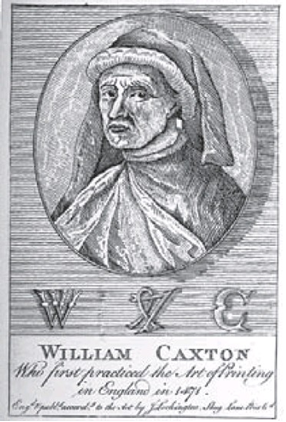William Caxton printed the first English language book in England 533 years ago

English books in print
IN the history of the world, one of the greatest inventions of all time is the printing press. Prior to the invention of the printing press, all books had to be written individually by hand or were produced using a labor-intensive process known as wood engraving.
Given the work required to produce a book in these ways, they were not widely available to the masses.
The printing press, invented by Johannes Gutenberg in 1440, is considered the most influential and greatest invention of all time.
Right around the time that Gutenberg was introducing his printing press to the world, a young English teenager named William Caxton left his hometown of Kent to become a merchants apprentice in London. Caxton soon moved on to Bruges, Belgium, which was then the capital of European trade.
Over the next three decades he became an extremely successful businessman and leader within the merchant community. Caxton was also a writer and scholar who spent much of his time translating the great books of European literature from French or Latin into English. At that time, few books were written or translated into English.
Well-established professionally and a prominent member of society, in 1470 Caxton became a close advisor of Margaret, Duchess of Burgundy, a French royal who encouraged Caxton to pursue his translations.
Now nearly 50 years old and with his fortune made, Caxton became fascinated with the technology of printing presses and went to Cologne, Germany to study printing. Caxtons passion for translations and for printing gave birth to a revolutionary idea the printing of books in the English language.
Caxton set up his own printing press in Bruges and in 1475 printed the first book every published in English, The Recuyell of the Historyes of Troye, a translation from French that had taken Caxton two years to complete. Caxton published a handful of books in Bruges, with at least one more an English translation.
Caxton then returned to England to print English language books. He set up his press in Westminster and got to work. The first book ever published in English in England appeared on November 18, 1477: Dictes and Sayenges of the Phylosophers.
Early printing was considered as much an art as a technology. The type of font, the spacing of the letters and words, all contributed to the look of the book.
Caxton was not a particularly artful printer, and he was an amateur scholar in his translations. Yet, his belief that books should be published in English made books available to English speaking people in their native language for the first time.
William Caxton printed books for the masses religious books, romances, history, philosophy and even an encyclopedia. He not only published English translations, but all of the English language literature available at the time.
William Caxton translated about 24 books during his lifetime, and printed about 100. Considering that he took up printing late in life and died less than 20 years after setting up his first press, this is a major accomplishment.
Picture Above: Williams Caxtons printed books in Englishsparked a huge spread of ideas and knowledge.


